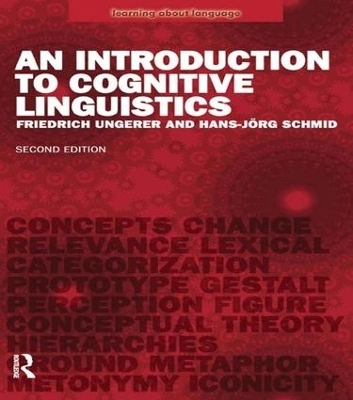
An Introduction to Cognitive Linguistics
Seiten
2015
|
2nd edition
Routledge (Verlag)
978-1-138-13147-7 (ISBN)
Routledge (Verlag)
978-1-138-13147-7 (ISBN)
Learning About Language is an exciting and ambitious series of introductions to fundamental topics in language, linguistics and related areas. The books are designed for students of linguistics and those who are studying language as part of a wider course.
Cognitive Linguistics explores the idea that language reflects our experience of the world. It shows that our ability to use language is closely related to other cognitive abilities such as categorization, perception, memory and attention allocation. Concepts and mental images expressed and evoked by linguistic means are linked by conceptual metaphors and metonymies and merged into more comprehensive cognitive and cultural models, frames or scenarios. It is only against this background that human communication makes sense. After 25 years of intensive research, cognitive-linguistic thinking now holds a firm place both in the wider linguistic and the cognitive-science communities.
An Introduction to Cognitive Linguistics carefully explains the central concepts of categorizaÂtion, of prototype and gestalt perception, of basic level and conceptual hierarchies, of figure and ground, and of metaphor and metonymy, for which an innovative description is provided. It also brings together issues such as iconicity, lexical change, grammaticalization and language teaching that have profited considerably from being put on a cognitive basis.
The second edition of this popular introduction provides a comprehensive and accessible up-to-date overview of Cognitive Linguistics:
Clarifies the basic notions supported by new evidence and examples for their application in language learning
Discusses major recent developments in the field: the increasing attention paid to metonymies, Construction Grammar, Conceptual Blending and its role in online-processing.
Explores links with neighbouring fields like Relevance Theory
Uses many diagrams and illustrations to make the theoretical argument more tangible
Includes extended exercises
Provides substantial updated suggestions for further reading.
Cognitive Linguistics explores the idea that language reflects our experience of the world. It shows that our ability to use language is closely related to other cognitive abilities such as categorization, perception, memory and attention allocation. Concepts and mental images expressed and evoked by linguistic means are linked by conceptual metaphors and metonymies and merged into more comprehensive cognitive and cultural models, frames or scenarios. It is only against this background that human communication makes sense. After 25 years of intensive research, cognitive-linguistic thinking now holds a firm place both in the wider linguistic and the cognitive-science communities.
An Introduction to Cognitive Linguistics carefully explains the central concepts of categorizaÂtion, of prototype and gestalt perception, of basic level and conceptual hierarchies, of figure and ground, and of metaphor and metonymy, for which an innovative description is provided. It also brings together issues such as iconicity, lexical change, grammaticalization and language teaching that have profited considerably from being put on a cognitive basis.
The second edition of this popular introduction provides a comprehensive and accessible up-to-date overview of Cognitive Linguistics:
Clarifies the basic notions supported by new evidence and examples for their application in language learning
Discusses major recent developments in the field: the increasing attention paid to metonymies, Construction Grammar, Conceptual Blending and its role in online-processing.
Explores links with neighbouring fields like Relevance Theory
Uses many diagrams and illustrations to make the theoretical argument more tangible
Includes extended exercises
Provides substantial updated suggestions for further reading.
Friedrich Ungerer is Professor of English Linguistics at the University of Rostock, Germany, but also has a background in applied linguistics and language teaching. Hans-Jörg Schmid is Professor of Modern English Linguistics at the University of Munich, where he is currently initiating the foundation of an Interdisciplinary Centre for Cognitive Language Studies. Both authors have published extensively in the field.
Introduction
1. Prototypes and Categories
2. Levels of categorization
3. Conceptual metaphors and metonymies
4. Figure and ground
5. Frames and constructions
6. Blending and relevance
7. Other issues in cognitive linguistics
Conclusion
| Erscheinungsdatum | 02.06.2016 |
|---|---|
| Reihe/Serie | Learning about Language |
| Verlagsort | London |
| Sprache | englisch |
| Maße | 156 x 234 mm |
| Gewicht | 453 g |
| Themenwelt | Geisteswissenschaften ► Philosophie ► Sprachphilosophie |
| Geisteswissenschaften ► Psychologie ► Allgemeine Psychologie | |
| Geisteswissenschaften ► Psychologie ► Verhaltenstherapie | |
| Geisteswissenschaften ► Sprach- / Literaturwissenschaft ► Anglistik / Amerikanistik | |
| Geisteswissenschaften ► Sprach- / Literaturwissenschaft ► Literaturwissenschaft | |
| Geisteswissenschaften ► Sprach- / Literaturwissenschaft ► Sprachwissenschaft | |
| ISBN-10 | 1-138-13147-4 / 1138131474 |
| ISBN-13 | 978-1-138-13147-7 / 9781138131477 |
| Zustand | Neuware |
| Haben Sie eine Frage zum Produkt? |
Mehr entdecken
aus dem Bereich
aus dem Bereich
Wie die Menschheit zu ihrer größten Erfindung kam
Buch | Softcover (2022)
C.H.Beck (Verlag)
18,00 €
Macht und Legitimität politischer Sprache im Prozess der europäischen …
Buch | Softcover (2023)
Nomos (Verlag)
74,00 €


